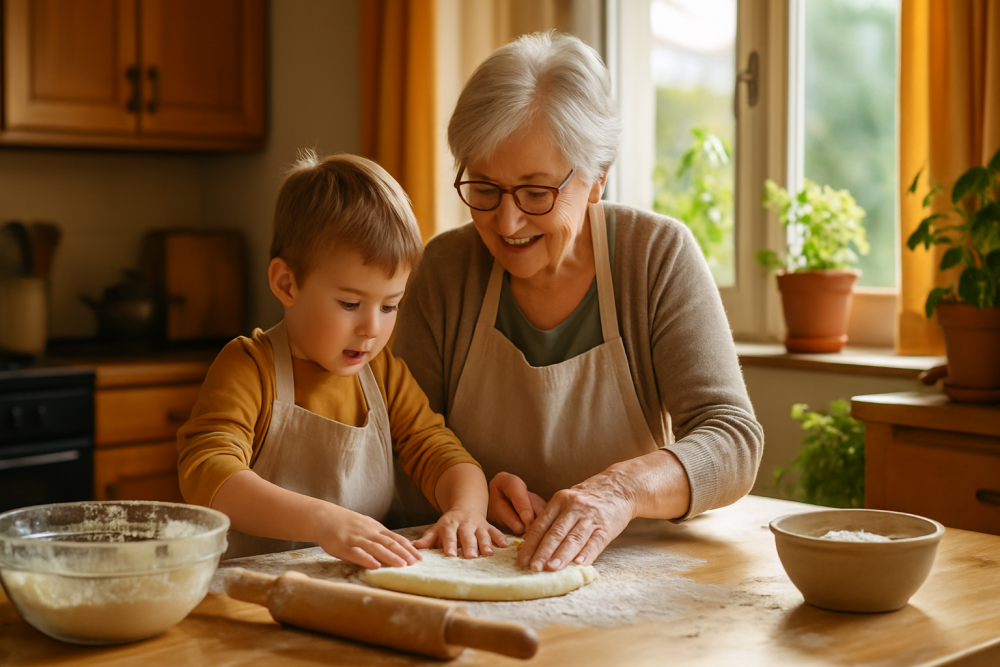
In today’s fast-moving world, the role of grandparents has never been more valuable — or more varied. Whether you’re a parent looking to nurture your child’s relationship with their grandparents, or a grandparent wondering how best to support and connect with your family, understanding the potential of this special bond can help everyone involved. Grandparents bring experience, patience, and perspective — and their presence can enrich a child’s life in countless meaningful ways.
The Changing Role of Grandparents in Family Life
Family structures have shifted. With more dual-income households, and many single parents juggling full-time responsibilities, support from grandparents is often essential. Grandparents may not have planned to be so involved, but in many homes they are indispensable.
In one family, for instance, a grandmother collects her grandson from school three days a week, stays until bedtime, and helps with reading practice and dinner prep. In another, a grandfather minds his toddler granddaughter on Tuesdays and Thursdays so her parents don’t have to rely on nursery full-time. Some grandparents step in during the holidays, when wraparound care is limited or prohibitively expensive. For working parents, a retired grandparent may even act as the main daytime caregiver.
But their value isn’t only logistical. Grandparents also provide a sense of continuity. They may share family traditions – like the same apple crumble recipe made every Sunday – or pass down cultural knowledge or religious practices. Some teach grandchildren practical skills: one boy learned how to plant tomatoes from his grandfather, who had grown up on a farm. A young girl developed a love of sewing after helping her nan make clothes for her dolls. These experiences build connections across generations and create shared memories that sit outside the usual parent-child dynamic.
Grandparents are increasingly visible in family life – attending school plays, sports matches, and even medical appointments. This presence adds depth to a child’s support system. When parents are under pressure, having another trusted adult who brings experience, calm, and love for the child, can make a real difference.
Positive Ways Grandparents Contribute to Child-Rearing
Here are three important areas where grandparents tend to make a meaningful, lasting impact:
1. Reliable Routine Support
For many working parents, knowing that a grandparent will be there at the school gate brings peace of mind. Children, too, often find this reassuring – a familiar face at pickup time offers comfort and consistency. One family shared that their daughter was initially anxious starting nursery, but having her gran collect her each afternoon helped her settle in quickly.
2. Emotional Support During Big Changes
Children can feel unsettled by life transitions, such as moving house or the arrival of a new sibling. Grandparents often help by keeping daily routines steady – doing the school run, making tea, reading bedtime stories – while parents manage the upheaval. In one case, a grandfather stayed with his daughter’s family for two weeks after the birth of twins, not to take over but simply to keep the older child’s routine predictable and focused.
3. Hands-On Learning and Shared Interests
Beyond babysitting, grandparents often introduce children to hobbies and skills that might otherwise be missed. A child might learn how to fix a bike, cook a favourite family dish, or identify different birds in the garden. These slow, skill-based interactions also foster patience, curiosity, and pride in learning from someone with lived experience.

And it’s not just about activities – grandparents often act as calm, non-judgemental listeners. Children might open up to them about worries they’re hesitant to share with their parents. A few quiet words over a jigsaw puzzle or during a dog walk can open up space for meaningful conversations.
Knowing When to Step Back: Avoiding Unwanted Interference
While the help grandparents offer is valuable, overstepping boundaries can strain relationships. Parenting approaches have evolved. Discipline styles, screen time rules, and dietary expectations may differ sharply from the past.
A common point of friction comes when grandparents allow more treats than parents permit, or question house rules in front of the child. Even comments meant warmly – such as “Oh, one biscuit won’t hurt!” – can feel undermining to the parents.
The best approach is for grandparents to offer support without assuming authority. Waiting to be asked for advice, rather than offering it unsolicited, makes it more likely to be heard and valued. When sharing a view, framing it as a story or experience – “When you were little, we used to try…” – can come across as thoughtful rather than critical.
If a disagreement arises, it’s usually best handled privately, without children present. For example: “We’re trying a new approach at bedtime that’s really helped. Could we stick with it when you’re here too?” Framing the conversation around what’s working, rather than what’s wrong, preserves dignity and encourages cooperation.
Establishing Healthy Boundaries with Grandparents
Boundaries protect relationships as much as they do routines. Parents may need to spell out specific expectations, even if it feels uncomfortable at first. Clear communication prevents misunderstandings.
- Write Things Down: A short note with key rules – no snacks after 5pm, only fruit as a snack, no TV before homework – is more helpful than vague instructions. It also avoids putting children in the middle.
- Have the Tough Talks in Private: If a rule is being ignored, speak with the grandparent when children aren’t present. Keeping the focus on what the child needs avoids sounding critical.
- Find Shared Ground: Emphasise that everyone wants what’s best for the child. Framing boundaries as part of creating a stable, nurturing environment for the child helps align perspectives.
Sometimes, compromise is the most practical solution. If the grandparent prefers a longer wind-down before bed, maybe they can start this earlier. This will give them time for a longer bedtime story and a goodnight chat while still honouring the agreed bedtime. These small flexes preserve the grandparent’s role while keeping the broader structure consistent.
Emotional and Social Benefits Grandparents Bring
Children benefit enormously from having a caring adult in their life who is not directly responsible for discipline or daily routines. That additional layer of unconditional love can be a stabilising force.
Grandparents also provide perspective. Through stories, photos, or traditions, they show children that their family extends beyond the here and now. In one family, a grandfather shared tales about emigrating to the UK as a child, helping his grandchildren understand the family’s roots and cultural identity.
These conversations help children build empathy and develop a broader understanding of how others live and think. Games and shared hobbies also teach taking turns, listening, asking questions, and cooperation – all important social skills.
In families with religious or cultural practices, grandparents often act as custodians of rituals or language, helping pass them on in a gentle, lived way. This creates a richer sense of identity for children growing up in mixed or modern families.
Building Positive Relationships with Distant or Less-Involved Grandparents

Not every family has regular in-person grandparent contact. Some grandparents live far away; others may be unable or unwilling to be actively involved. Still, there are ways to keep relationships meaningful.
- Video Calls: Weekly chats – even just 10 minutes – can make a difference. Reading a book together or showing a new toy over the screen gives the call a focus.
- Send and Receive Mail: Kids love post. Homemade cards, small drawings, or printed photos can keep the connection alive. Grandparents can reply with notes or postcards that become keepsakes.
- Share Milestones: Send clips of school concerts, sports events, or birthdays. Even if they can’t attend, knowing they were thought of builds the bond.
- Create Traditions at a Distance: One family makes biscuits using their grandmother’s recipe each school holiday and sends a photo. Others arrange monthly craft swaps or play a favourite game over video link.
What matters most is consistency and intention. Grandparents don’t need to be physically present every day to be a meaningful part of a child’s world.
Frequently Asked Questions
How can grandparents avoid overstepping while still being supportive?
Follow household routines and offer advice only when asked. Respect the rules parents have set – even if they differ from your own views.
What if grandparents and parents completely disagree on discipline?
It helps if parents calmly explain their approach and why they’ve chosen it. Asking grandparents to try the method for consistency tends to work better than criticising. Agree on what can be flexible, and hold firm on the non-negotiables.
How can families keep bonds strong with grandparents who live far away?
Video calls, shared stories, drawings, and creating regular “rituals” like a game or recipe are effective. Small, repeated gestures mean more than the occasional big moment.
Wrapping Up
Grandparents can be a powerful source of support, love, and stability. When their role is clear, and expectations are openly shared, families benefit from this rich intergenerational connection. A thoughtful balance of communication and respect ensures grandparents remain a welcome and positive part of children’s lives – whether they live nearby or keep in touch from afar.
